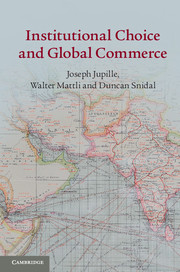Book contents
- Frontmatter
- Contents
- List of figures
- List of tables
- Acknowledgements
- Part I
- Part II
- 4 Creating the first international court of commercial dispute resolution
- 5 Commercial complexity and institutional choice in the GATT era
- 6 Institutional choice in global accounting governance
- Part III
- Bibliography
- Index
- References
4 - Creating the first international court of commercial dispute resolution
The Mixed Courts of Egypt
Published online by Cambridge University Press: 05 June 2014
- Frontmatter
- Contents
- List of figures
- List of tables
- Acknowledgements
- Part I
- Part II
- 4 Creating the first international court of commercial dispute resolution
- 5 Commercial complexity and institutional choice in the GATT era
- 6 Institutional choice in global accounting governance
- Part III
- Bibliography
- Index
- References
Summary
Introduction
Sir Maurice Amos, British Judicial Advisor to the Egyptian government, noted in his farewell address in Alexandria on March 25, 1925: “I have often taken occasion to remark that next to the Church, the Mixed Courts are the most successful international institutions in history.” Celebrated by the international community from their launch in 1876 as the first modern international system of commercial dispute resolution, the Mixed Courts of Egypt – which closed their doors shortly after the Second World War – are largely forgotten today. Neither international relations experts nor legal scholars, economic historians, or even Middle East experts seem ever to have heard of these remarkable institutions.
This chapter sheds light on their Creation and remarkable robustness in extraordinarily turbulent economic and political times. It offers a test of our theory's conjectures regarding institutional Use and Change. The case study illustrates the explanatory power and usefulness of the book's analytical framework.
The institutional status quo for international commercial dispute resolution throughout the Middle East, North Africa, and parts of Asia from the sixteenth century to the nineteenth century was populated by the consular courts. These courts operated on the principle actor sequitor forum rei; that is, cases were judged by the defendant’s consul according to the laws in the defendant’s home state. Eastern rulers willingly offered such extraterritorial jurisdiction in return for trade, capital, and talent from the West.
- Type
- Chapter
- Information
- Institutional Choice and Global Commerce , pp. 105 - 131Publisher: Cambridge University PressPrint publication year: 2013



